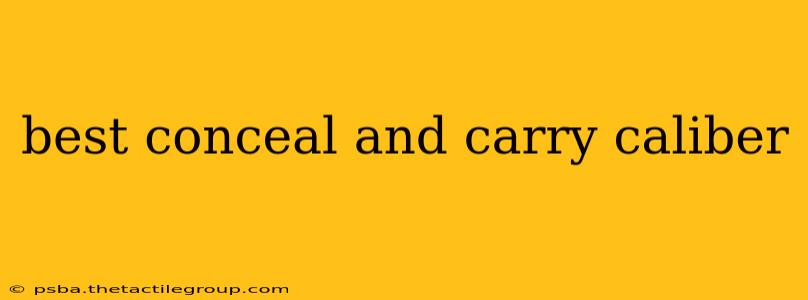Choosing the best concealed carry caliber is a deeply personal decision, influenced by factors ranging from your physical capabilities and experience level to your personal threat assessment and comfort level. There's no single "best" caliber; the ideal choice depends entirely on your individual circumstances. This guide will explore popular options, highlighting their strengths and weaknesses to help you make an informed choice.
Factors to Consider When Selecting a Caliber
Before diving into specific calibers, let's examine the key factors influencing your decision:
- Shootability: How comfortable are you shooting the firearm? A more powerful round might be less effective if you can't accurately place your shots under stress. Consider recoil, muzzle flip, and overall handling characteristics.
- Stopping Power: This refers to the round's ability to incapacitate a threat. Larger calibers generally offer more stopping power, but shot placement remains paramount.
- Concealability: The size and weight of the firearm are crucial for comfortable concealed carry. Smaller calibers often translate to smaller, lighter guns, but this comes with trade-offs in stopping power.
- Capacity: Magazine capacity influences how many rounds you can carry, affecting your ability to engage multiple threats.
- Recoil Management: Excessive recoil can impact accuracy and make follow-up shots difficult.
- Availability of Ammunition: Ensuring reliable access to ammunition is essential. Popular calibers generally have greater availability.
- Cost: Ammunition and firearm costs vary significantly between calibers.
Popular Concealed Carry Calibers: A Comparative Look
Let's examine some of the most commonly used concealed carry calibers:
9mm: A Versatile and Popular Choice
The 9mm is a ubiquitous round, lauded for its balance of manageable recoil, decent stopping power, high capacity magazines, and widespread availability. It's a great choice for both new and experienced shooters, offering a good compromise between shootability and effectiveness. Many advancements in 9mm ammunition have increased its stopping power significantly over the years.
.45 ACP: Powerful but with a Trade-off
The .45 ACP is known for its substantial stopping power, but it comes with increased recoil and a lower capacity compared to 9mm. This makes it less ideal for those prioritizing rapid follow-up shots or those new to firearms.
.40 S&W: A Middle Ground?
The .40 S&W aimed to bridge the gap between 9mm and .45 ACP, offering more stopping power than 9mm but less recoil than .45 ACP. However, its popularity has waned somewhat in recent years, with many opting for the 9mm's superior capacity and manageable recoil.
.380 ACP: Small and Concealable, but Less Powerful
The .380 ACP is a smaller, less powerful round, ideal for extremely small and lightweight pistols. Its suitability for self-defense is a matter of ongoing debate, as its stopping power is significantly less than 9mm or .45 ACP. It's generally considered a better choice for smaller individuals who prioritize concealability above all else.
Other Calibers: .22 LR, 10mm
While less common for concealed carry, the .22 LR offers high capacity and minimal recoil, but extremely low stopping power making it generally unsuitable for self-defense. The 10mm is a powerful round with significant recoil, requiring substantial training and practice to manage effectively.
Choosing the Right Caliber for You
Ultimately, the "best" concealed carry caliber is subjective. Consider attending a firearms safety course and trying out different calibers at a shooting range to determine what feels most comfortable and manageable for you. Consult with experienced shooters and firearm professionals for personalized guidance. Your choice should prioritize your safety and comfort, ensuring you can accurately and reliably use your firearm in a self-defense situation. Remember, responsible gun ownership includes regular training and practice.

